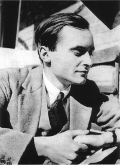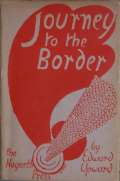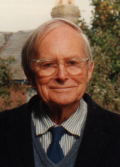Introducing Edward Upward
Edward Upward was a writer of novels and short stories from the 1920s until into the present century. His literary associates included Christopher Isherwood, W. H. Auden and Stephen Spender. Upward’s early and late stories often involve a fantastical element, whilst his trilogy of novels The Spiral Ascent recalls the events and atmosphere of his overlapping literary, political and educational worlds. The question of how art should relate to real life and, more specifically, how a socialist can combine artistic creativity with political commitment, is central to his mature work.
A Brief Biography
Early Years
Upward was born in 1903 in Romford, England, where his father had a doctor’s surgery. He was sent away to private schools, first to a ‘prep’ school and then to Repton ‘public’ school, where he formed a life-long friendship with Christopher Isherwood. He went on to Cambridge to study history and English and was followed there a year later by Isherwood.
Whilst at Cambridge, Upward and Isherwood collaborated in writing a series of surreal and anti-establishment stories about the inhabitants of the imaginary village of Mortmere. These were written for private experimentation rather than publication and although in 1928 Upward contributed the most substantial story, ‘The Railway Accident’, for many years he only allowed its publication in the US under the pseudonym of Allen Chalmers.

Upward had originally hoped to become a poet but at Cambridge he decided his verse wasn’t good enough and began a long search for a way of writing that would satisfy him. After leaving university he took up a number of teaching posts as a tutor or at schools but he found this work hard to combine with his attempts at writing.
The Thirties
Upward had always been rebellious, refusing the Christian confirmation and opposing the public school institutions of ‘fagging’ and the Officers’ Training Corps. He had seen older pupils leave to die in the First World War and by the 1930s war was threatening again in a Europe ravaged by economic crisis. He also witnessed at first-hand the rise of Fascism when he visited Isherwood in Berlin. In 1932 he joined the Communist Party, a decision which changed his life and his writing. In the same year he began teaching at Alleyn’s school in Dulwich, where he was to continue working until retirement.
During the thirties several of Upward’s stories were published and he also wrote pieces for the Teachers’ Anti-War Movement magazine, The Ploughshare. In 1938 the Hogarth Press brought out his first novel Journey to the Border which showed the influences both of the fantasy and poetic language of Mortmere and of his new political commitment. In the novel a tutor tries to escape from the reality of his servile situation by inducing a hallucinatory consciousness in himself. This provides no relief however, as frightening characters associated with various evils in the real world begin to appear in his fantasy. Finally the tutor recognizes that he must confront reality rather than change his perceptions, and decides to join the workers’ movement.

In 1936 Upward had married Hilda Percival, also a teacher and member of the Communist Party, and they had a son and daughter in the following years. During the Second World War Upward was evacuated with his school to Maidstone in Kent and then to Fleetwood in Lancashire. Upward struggled to write anything that he was happy with for many years after his first novel, largely because of the difficulties he found in combining his imaginative and political ideas.
After the War
By 1948 Upward and his wife felt forced to leave the Communist Party because they believed that the party’s post-war policy in Britain was no longer revolutionary. Upward continued to teach until his retirement to the Isle of Wight, where he was able to devote himself to completing his major work, the semi-autobiographical trilogy The Spiral Ascent. He and Hilda continued their political activity, in the Campaign for Nuclear Disarmament and an independent socialist group, and supported other causes such as civil liberties and the campaigns against the American war in Vietnam and apartheid. He corresponded with old associates as well as younger left-wing writers such as Adrian Mitchell and Harold Pinter. Isherwood and Upward continued to exchange views on their new writing (Isherwood regarded Upward as ‘the judge before whom all my work must stand trial’) and they remained friends until Isherwood’s death.

Having seen the final volume of The Spiral Ascent published at last in 1977, Upward embarked on writing short stories once again, some of them revisiting themes of art and politics and often involving dream or fantasy, and others telling poignant tales of old age. After Heinemann’s publication of The Night Walk and Other Stories, Stephen Stuart-Smith at Enitharmon Press brought out several further collections of new stories as well publishing The Mortmere Stories and a revised Journey to the Border. In his later short stories Upward felt he had achieved a new synthesis between the imaginative and political sides of his writing. He retained his hatred of war and oppression as well as a rich knowledge of literature until his death in 2009.